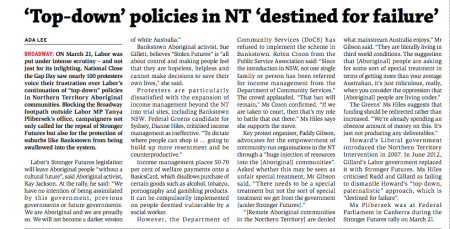Published in the South Sydney Herald, p. 7, 1 April 2013.
Click here to see it online.
Ada Lee
BROADWAY: On March 21, Labor was put under intense scrutiny – and not just for its infighting. National Close the Gap Day saw nearly 100 protesters voice their frustration over Labor’s continuation of “top-down” policies in Northern Territory Aboriginal communities. Blocking the Broadway footpath outside Labor MP Tanya Plibersek’s office, campaigners not only called for the repeal of Stronger Futures but also for the protection of suburbs like Bankstown from being swallowed into the system.
Labor’s Stronger Futures legislation will leave Aboriginal people “without a cultural future”, said Aboriginal activist, Ray Jackson. At the rally, he said: “We have no intention of being assimilated by this government, previous governments or future governments. We are Aboriginal and we are proudly so. We will not become a darker version of white Australia.”
Bankstown Aboriginal activist, Sue Gillett, believes “Stolen Futures” is “all about control and making people feel that they are hopeless, helpless and cannot make decisions to save their own lives,” she said.
Protesters are particularly dissatisfied with the expansion of income management beyond the NT into trial sites, including Bankstown NSW. Federal Greens candidate for Sydney, Dianne Hiles, criticised income management as ineffective. “To dictate where people can shop is … going to build up more resentment and be counterproductive.”
Income management places 50-70 per cent of welfare payments onto a BasicsCard, which disallows purchase of certain goods such as alcohol, tobacco, pornography and gambling products. It can be compulsorily implemented on people deemed vulnerable by a social worker.
However, the Department of Community Services (DoCS) has refused to implement the scheme in Bankstown. Robin Croon from the Public Service Association said: “Since the introduction in NSW, not one single family or person has been referred for income management from the Department of Community Services.” The crowd applauded. “That ban will remain,” Ms Croon confirmed. “If we are taken to court, then that’s my role to battle that out there.” Ms Hiles says she supports the move.
Key protest organiser, Paddy Gibson, advocates for the empowerment of community-run organisations in the NT through a “huge injection of resources into the [Aboriginal] communities”. Asked whether this may be seen as unfair special treatment, Mr Gibson said, “There needs to be a special treatment but not the sort of special treatment we get from the government [under Stronger Futures].”
“[Remote Aboriginal communities in the Northern Territory] are denied what mainstream Australia enjoys,” Mr Gibson said. “They are literally living in third world conditions. The suggestion that [Aboriginal] people are asking for some sort of special treatment in terms of getting more than your average Australian, it’s just ridiculous, really, when you consider the oppression that [Aboriginal] people are living under.”
The Greens’ Ms Hiles suggests that funding should be redirected rather than increased. “We’re already spending an obscene amount of money on this. It’s just not producing any deliverables.”
Howard’s Liberal government introduced the Northern Territory Intervention in 2007. In June 2012, Gillard’s Labor government replaced it with Stronger Futures. Ms Hiles criticised Rudd and Gillard as failing to dismantle Howard’s “top-down, paternalistic” approach, which is “destined for failure”.
Ms Plibersek was at Federal Parliament in Canberra during the Stronger Futures rally on March 21.
For a previous story on this issue, click here.


